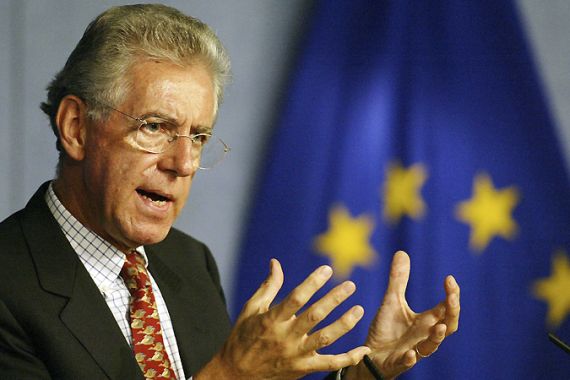Monti emerges as Italy’s likeliest leader
Former EU bureaucrat meets Italian president as country’s borrowing costs ease on hopes of imminent political deal.

 |
| Mario Monti is among the possible candidates to succeed Silvio Berlusconi when he steps down [REUTERS] |
A former European Union bureaucrat and respected economist has emerged as the frontrunner to become Italy’s next prime minister, as Italy’s cost of borrowing fell back on hopes that a new government to tackle the country’s debt crisis could soon be in place.
Mario Monti, who previously served on the European Commission, the European Union’s executive arm in Brussels, met Italian President Giorgio Napolitano on Thursday evening amid speculation that the 68-year-old is poised to replace the outgoing Silvio Berlusconi.
Keep reading
list of 4 items‘Triple spending’: Zimbabweans bear cost of changing to new ZiG currency
Boeing hit with 32 whistleblower claims, as dead worker’s case reviewed
US imposes new sanctions on Iran after attack on Israel
Monti was appointed a senator-for-life on Wednesday by Napolitano in a move widely interpreted as an endorsement. Napolitano on Thursday asked him to stay in Rome over the weekend, Reuters reported.
Napolitano on Wednesday moved to ease concerns over Italian political instability by saying that a new government would be in place, and a new financial stability law adopted, “within the space of a few days”.
Monti’s likely appointment is not welcomed by all, however, with the far-right Northern League, Berlusconi’s former coalition ally, saying that it would not back a Monti-led government.
Italy’s political and economic turmoil has spurred fears of a possible break-up of the eurozone with borrowing costs for Europe’s third biggest economy at unsustainable levels and the 17-nation currency bloc unable to afford a bailout.
Borrowing rates were better than expected on Thursday, however, as Italy sold $6.8bn in 12-month bonds at an interest rate of 6.1 per cent, with demand for bonds almost twice the amount on sale.
That was up sharply from 3.6 per cent in the last such auction last month, but well below analyst expectations of seven per cent – the level at which other eurozone countries such as Greece, Ireland and Portugal required bailouts.
There was speculation that the European Central Bank was back in the markets on Thursday trying to get Italy’s borrowing rates down.
The ECB has been buying up Italian and Spanish bonds in the secondary markets in recent days in an effrot to help keep borrowing rates from becoming unsustainable, but the bank did not comment.
Berlusconi pledged to step down earlier this week after the collapse of his governing majority, but has said he wants parliament to pass key economic reforms to tackle the debt crisis first.
But while moves towards appointing a new government appeared to ease market fears on Thursday, Luca Mezzomo, an analyst, said that a “sharp deterioration” in the country’s economic activity posed a greater threat to the nation’s future than the political crisis.
“I think that the political events remain key to the outlook for the country and for the government debt market,” said Mezzomo.
“Unfortunately, it is not the only issue now. We are also seeing a sharp deterioration in real economic activity with worsening of business confidence and declines in industrial output.”